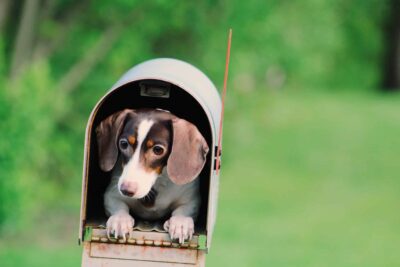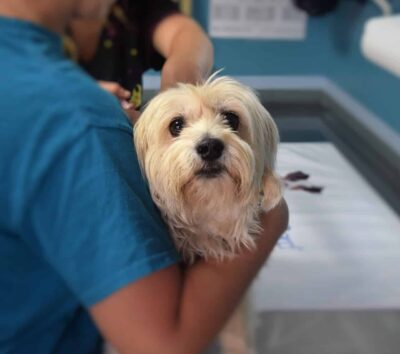Should Pet Owner's be Worried?
As millions worldwide continue to contract Covid-19, more and more of our pets are testing positive for a virus thought to only affect humans. We are left to ask the question; how far can the virus go? The CDC states that COVID-19 originated from bats and that the first reported infections were linked to a live animal market. At some point, the virus spread from animal to person and became a rampant pandemic. As we know now, the infection spreads from person to person through respiratory droplets from coughing, sneezing, and talking. Studies done recently found that people who are infected but do not show any symptoms can spread COVID-19 as well. This begs the question, are our pets getting infected by other animals or by us?

Scientists are looking into this exact question, and from their preliminary studies, there is a small chance that pets can contract COVID-19, especially after close contact with a person sick with COVID. This was the case on April 5, 2020, when the first US report stemmed from a tiger testing positive at a New York Zoo. This led to other lions and tigers testing positive within the zoo, and from that point on, other cases have popped up of dogs, cats, and minks testing positive as well.
According to the CDC, studies are in their infancy, but the current research shows that cats, ferrets, and golden Syrian hamsters can be infected and spread the infection. The data also shows that mice, pigs, and ducks do not become infected or spread the infection. One study suggests that dogs can get infected but might not spread the virus to other dogs like cats and ferrets.
If you are a pet owner, you need to treat pets just as you would any other human to protect them from possible infection. The CDC’s listed examples are steps you can follow to protect your pet and avoid the inconvenience of visiting a veterinarian or infecting other animals around you.
1. Limit your pet’s interaction with people outside your household
2. Do not put a mask on pets. Masks can harm your pet
3. Keep cats indoors when possible and do not let them roam freely outside
4. Walk dogs on a leash at least 6 feet away from others
5. Avoid public places where a large amount of people gathers

Current CDC studies advise not to worry of pets infecting you or other animals through fur or skin contact. This means pet owners should not wipe or bathe their pets with chemical disinfectants, alcohol, hydrogen peroxide or any other chemicals not approved for pet use.
If you suspect you have been infected by COVID or are infected, you should follow certain protocols to make sure you do not infect anyone else, including your pet. The most important advice the CDC provides is to restrict contact with your pets and other animals. Until further studies are performed, this simple step can save your pet from an illness that could have been avoided. Here are three more steps to follow and prevent COVID.
1. When and if possible, have another member of your household care for your pet while you are sick.
2. Avoid contact with your pet, including petting, snuggling, being kissed or licked, sharing food, and sleeping in the same bed together.
3. If you must care for your pet or be around animals while you are sick, wear a mask and wash your hands before and after interacting with them.
How to know if my pet has contracted COVID-19?
Now, the exact symptoms for animals are not well defined, and no standard protocols are in place. As a rule, the CDC recommends looking for signs more compatible with SARS-CoV-2, which is a strain of the COVID virus more related to animals. Here are some symptoms that animals may show or a combination of them:
- Fever
- Coughing
- Difficulty breathing or shortness of breath
- Lethargy
- Sneezing
- Nasal discharge
- Ocular discharge
- Vomiting
- Diarrhea

If you suspect your pet possibly has COVID-19 after reviewing these symptoms, do not take your pet to the veterinary clinic right away. The CDC suggests you call your veterinarian and let them know your pet is sick, and in the case, you are sick, let them know as well. If your veterinarian can see your pet have a friend or a relative outside of the household, arrange the visit. Some veterinarians may offer telemedicine consultations or other plans for seeing sick pets. Your veterinarian will evaluate your pet and determine the next steps for your pet’s treatment and care. For State public safety, your veterinarian will also notify a state public health veterinarian to keep track of the outbreak and make additional suggestions.
Taking precautions if your pet is sick.
In the case where your pet is sick with COVID-19, you will need to take certain precautions even if there is a small degree of transmission. Here are some suggestions from the CDC and the American Veterinary Medical Association (AVMA):
if you are infected as well, temporary sheltering of your pet in your home is a good idea to stop the spread. If only your pet is sick, it is advised to shelter your pet in a state animal shelter. If this is not possible, take further steps to keep the risk of infection low.
1. Do not take your pet to dog parks, markets, or other gatherings
2. Do not visit the groomer including mobile groomers salons
3. Do not visit pet daycares or boarding facilities
4. Do not go on hikes or visit other homes
5. Do not use dog walkers or pet sitters unless they live with you
6. Avoid contact with your pet including keeping a 6-foot distance from them.
7. Washing hands with soap and water for 20 seconds or using a hand sanitizer that contains at least 60% alcohol before and after handling your pet.
8. Food bowls, water bowls, toys, and bedding should be routinely cleaned and sanitized. If you need help with products safe to use for sanitizing, click on this link to the EPA’s website.
9. Soft items like towels, blankets, etc. can be laundered and reused
10. As mentioned above don’t bathe animals with anything not approved for pets
11. Don’t let your pets interact with other pets or humans, and only allow minimal exercise when possible
12. Avoid touching your eyes and mouth
13. Feces should be collected using gloved hands or a bag and disposed immediately
14. Clean dirty surfaces including areas your pet frequents

When is it safe for your pet to be around others?
You will need to follow up with your veterinarian to know it’s safe for your pet to be around others. Unless your veterinarian advises on following strict protocol you should follow the following steps to make sure your pet is virus-free.
1. Your pet has not shown clinical signs consistent to SARS-CoV-2 infection for at least 72 hours without medical management
2. It has been at least 14 days since their last positive test from the lab
It goes without saying that the virus is here to stay longer than we expected. Fortunately, the current studies suggest animals while at some risk are not highly infectious or contagious. As long as you understand the virus is still highly contagious and follow simple steps, you and your pets will have a better chance of avoiding what many have not. Take note that these precautions and simple steps are only general guidelines and should not be taken as the only lines of defense. Always consult your veterinarian for medical advice if you feel your pet might have contracted the virus. As the CDC continues their studies, be cautious and observant of your pets, and any symptoms or changes in behavior should be monitored and followed up with their veterinarian.
Recent Pet Posts
Blog Categories
Product categories
- Accessories (7)
- Chicken & Veggie Wraps (8)
- Grillers Jerky Tenders (4)
- Jerky Treats (10)
- Made in the USA (9)
- Non-Rawhide Treats (28)
- Beggar Bone (11)
- Bully Sticks (4)
- Butcher Bone (4)
- Cod Skin Fish Treats (3)
- Pork Skin Twists (2)
- Pressed Rawhide Bones & Rolls (16)
- Bones & Rolls (6)
- Pressed Rawhide Bulk (6)
- Twist Sticks (4)
- Savory Munchies (13)
- Supreme Bones & Rolls (48)
- American Rawhide Bulk (16)
- Rawhide Bones (14)
- Rawhide Chips (6)
- Rawhide Rolls & Sticks (12)
- Uncategorized (8)

